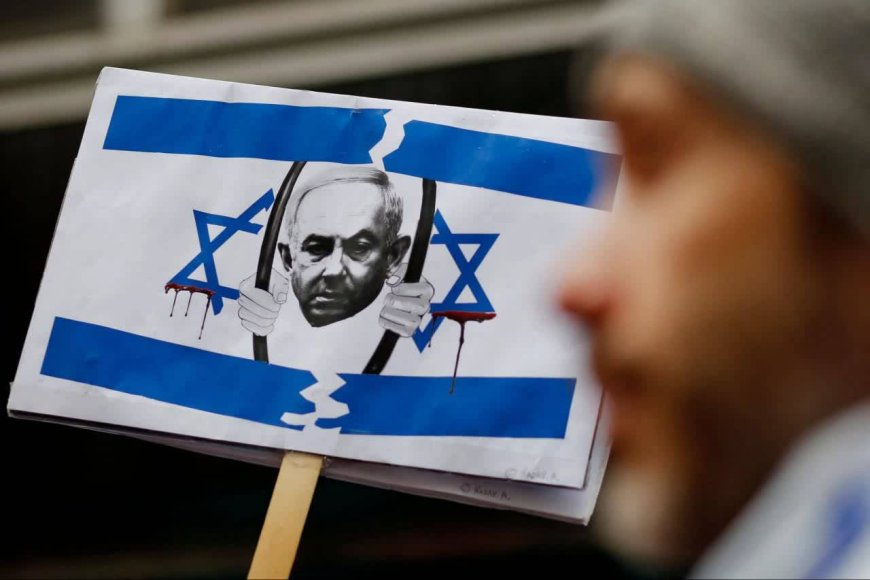Sociopolitical crises in Israel and the looming prospect of its partition

By: H. Zaïm-Bashi
Israel's socioeconomic divides are nothing new. However, in light of the upsurge in demonstrations and the expansion of weekly rallies across the occupied territories, the schisms have grown to such dimensions that it has led Netanyahu's advisors to issue grim warnings. The hostility and turmoil within Israel only seem to worsen as time passes.
The bleak situation in the occupied territories, which has nearly driven the Zionist regime to the verge of an impending civil war, is best reflected by the indignant protests against Netanyahu's judicial overhaul.
To the people living in the occupied territories, security threats pose the most immediate threat (29%), followed by crime and a lack of personal security (19%), a shift in political leadership (16%), tensions between Jews and Arabs (13%), and the state-religion relationship (11%). The debate over integrating the Haredi community into the market ranked last, with barely 3% of votes.
In this regard, people's political leanings have a significant impact on the problems they choose to prioritise. Security concerns are a significant issue for 44% of right-wing supporters, while 51% of centre- and left-wing supporters cite radical changes to the political system as the most pressing issue.
Over the last year, the rift between the secular and orthodox Jewish communities has grown wider.
As public opinion continues to diverge, some have proposed dividing Israel into two states: one, called Judea, would have a more conservative national flavour, while the other, Israel, would have a more secular, modern, and Western character.
In response to the question, do you approve or disapprove of Israel's partition? Seventy-four per cent of Netanyahu's supporters opposed the possible division of Israel, while only eight per cent supported it. In contrast, 56% of opposition supporters voted no, while 25% supported it.
In response to the question, in which state would you choose to reside? Forty-six per cent choose secular-liberal Israel. Only about 30% of the preponderants preferred traditional, nationalist Judea. Approximately 17% of pro-Netanyahu voters choose Israel, while 55% choose the conservative Judea. 88.8% of opposition party members opted to live in liberal Israel, while only 3% chose Judea.
According to a recent poll, 46% of Netanyahu's legal reform advocates are disappointed with how the situation in Israel has played out. 43% believe the circumstances obliged them to stand up for Israel's so-called honour. 97% of Zionist citizens prefer Israel to continue as a Jewish state. According to the Jewish People's Policy Institute [JPPI], the opposing views of Zionist citizens are deceptive and exaggerated. In reality, the vast majority of Israelis want their country to be both Jewish and democratic. In actuality, the overwhelming majority of Israelis desire that their nation be both Jewish and democratic!
97% of Jews, according to this research, want Israel to be Jewish. 92% want the Israeli government to safeguard religious freedoms, while 88% want equal social and political liberties for all Israelis. The same study indicates that 44% of Arabs recognise Israel as a Jewish state or do not care. Nearly half (46%) of Arab respondents want Israel to cease being a Jewish state.
On the other hand, concerns have intensified in recent months about the lack of reaction among Arabs living in occupied territories regarding the judicial reform bill. They haven't participated in or even shown support for the protests. Despite making up just 21% of Israel's population, the 1948 Arabs will also be negatively impacted by this new law. Remarkably, Arabs refrain from discussing the ongoing political crisis. According to sociologists, the lack of Arab reaction to political and social events is an ominous sign for the Zionist regime.
Moreover, Arabs have this solid conviction that Israel [the Zionist regime] is a Jewish state and that they will always be a minority, no matter what. 46% of Arabs have said they are opposed to Israel being a Jewish state but do not want to attend political gatherings where Jewish-Zionist symbols are present, which points to fatal fault lines in Israeli society. Meanwhile, the Zionist army's barbaric attacks on Palestinian civilians in the West Bank and the increasingly fascist policies of Netanyahu's far-right cabinet, which are especially true of ministers like Itamar Ben-Gvir and Bezalel Smotrich, have further alienated Arabs in the occupied territories.













































